We all know that the brains of little children are like thirsty sponges, soaking up everything around them. That’s why it’s so important to sing and read to toddlers, as well as to play rhyming and counting games. That way they get comfortable and familiar with words and numbers, and can make a confident start with reading, writing and maths when they go to school.
We know other things are important too. Teaching our child to say thank you, say, or to wash their hands after going to the loo.
But how many of us know how important it is to start fostering the good habits of mind that are guaranteed to give a child a flying start in school?
I certainly didn’t, when my children were young. I had no idea. And if I had known then what I know now I would have made much, much more effort to encourage in them the attitudes and values that are now known to give children the very best foundation for learning – and for life.
What I’m talking about here are characteristics like resilience, persistence and courage – things that help a child deal with setbacks, stick at tasks, feel optimistic about their abilities to master new skills, and learn how to face up to things that might be scary or uncomfortable.
Then there are other, less obvious, things that also deeply affect a child’s performance in the classroom. Anyone who has ever taught in school, or watched lessons in progress, knows that there is a world of difference between the secure, well-loved child, full of enthusiasm for life, who hoovers up new learning with joy and confidence, and the nervous, insecure, shut-down child who simply doesn’t feel free and happy enough to learn well. Making sure that your child knows they are loved, and helping them develop the ability to love themselves, to love others, and to meet the world around them with curiosity and wonder, is as important for school success as it is for general psychological well-being.
Kindness and honesty are also things that support good learning. An awful lot of research has now been done to identify the attitudes that help children do well in school, and a number of them are ‘softer’ values – things that at first glance don’t seem to have much to do with lessons and exam results, but that are actually crucial. For instance, researchers have demonstrated that when children are actively encouraged to do small daily acts of kindness, they make more friends – which in turn helps them enjoy school more and get more out of it. While both kind behaviour and honest behaviour are known to release inside us hormones that help us feel happier and more confident in our own skins.
Which is not to say that parents should get over-serious about these things and start investing in videos and bedtime stories with heavy messages about the virtues of bravery, resourcefulness and integrity.
Instead, the important thing to hold in mind is that the attitudes you most encourage at home will be the ones your pre-schooler will take forward into school, and that anything you can do to coax them towards thinking well and optimistically about themselves and the world around them will help them grow the kind of strong, flexible inner core that will stand them in terrific stead as they go forward.
But how to do that?
Show don’t tell is an obvious maxim. Try and model by example, as well as using the many moments of everyday life to highlight good messages. Praise effort rather than achievement, and make sure your child knows that it’s ok to make mistakes – they are how we all learn. There are hundreds of thousands of ways to gently foster good habits of mind, and my books outline some of them, but nothing beats simply being aware that that’s what you are aiming to do.
And always try to hang onto that difficult parenting balance between being both hands-off and hands-on. Don’t wrap your pre-schooler in cotton wool, or try and smooth out everything in their path. They need to start learning to solve problems and overcome challenges to help them grow strong. But don’t be too hands-off either. They need you to be the adult. To interpret the world for them, to set safe boundaries, to help them build good relationships, and to encourage them to start learning how to run their powerful brains well.
That way, they’ll feel both adventurous and secure, and you’ll know that when they start school they’ll be more than ready for all that’s on offer.
Hilary Wilce is an education writer and personal development coach, and the author of Backbone: How to Build The Character Your Child Needs To Succeed and The Six Secrets of School Success, both available through the Amazon Kindle store. For more information visit her website www.hilarywilce.com.
- words: Hilary Wilce
You may also like
Perfect Pitch
Mike Piercy, education consultant and former Head of The New Beacon, sings the praises of music in education What exactly is it that drives parents to make huge sacrifices by sending their children to independent schools? Different families have different...
‘It’s not fair!’
Mike Piercy, education consultant and former Head of The New Beacon, explains the importance of winning and losing with good grace The beefy second row lay prone, groaning, as the pack lumbered away. “Get up, Darling!” I cried. Opposition spectators...
Performance Power
Eastbourne College and Bede’s School discuss opportunities which give their students time to shine Director of Music at Eastbourne College, Dan Jordan, sings the praises of music at the school. It is 6.30pm, the night before a well-needed half-term holiday....















